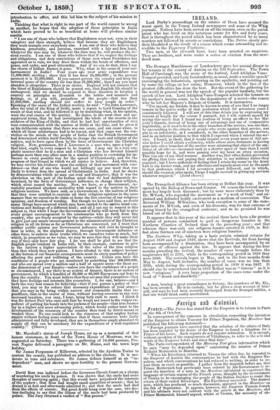IRELAND.
Lord Derby's proceedings on the estates of Doon have aroused the worst spirit in the Young Ireland newspapers and some of the Whig journals. Notices have been served on all the tenants, even on the parish priest who has lived on this notorious estate for five and forty years, that is throughout the period which has been characterized by so many murders not followed by arrests or convictions. The Nation openly pre- dicts bloodshed as the result of a course which seems astounding and in- credible to the Tipperary Vindkator.
Two men, at the eleventh hour, have been arrested on suspicion. They are brothers, and were under a notice of eviction from the mur- dered man.
The Dowager Marchioness of Londonderry gave her annual dinner to her tenants in the county of Antrim on the 22d September. The Town Hall of Carnlough was the scene of the festival, lord Adolphus Vane- Tempest presided, and Lady Londonderry, as usual, made a sensible speech' encouraging the industrious, spurring on the apathetic, and pointing out by name the village on her estate, Dumcrow, which in the face of the greatest difficulties has done the best. But the event of the gathering for the world in general was not the speech of the popular landlady, but the speech of her son. Lord Adolphus Vane-Tempest selected the tenants on his mother's Antrim estate to be the depositaries of a secret—the reason why he left her Majesty's Brigade of Guards. It is instructive. " For myself, my friends, it may be known to some of you that I no longer 'remain in the active walks of that profession which for seventeen years I consistently followed. I will not at this time detain you by expressing my reasons at length for tho course I pursued, but I will content myself by saying this much that I found my position of being an officer in her Ma- jesty's Guards, instead of being one of advantage and one of comparative superiority, as it used to be to the other branches of the service, was one that, by succumbing to the attacks of people who wrote against that service, was put in an inferiority, as I considered to the other branches of the service, and in an inferior position to that which I expected when I entered the ser- vice. I found, in short, that it would require seven years more of full ser- vice before I could attain a coloneley, while others more fortunate in having gone into other branches of the service were attaining that object of the am- bition of all officers—increased rank in a shorter space of time than I could possibly hope for it, and were passing over my head on every occasion. This was one of my chief reasons. Another was, that other duties prevented me giving that time and paying that attention to my military duties they required ; but I have sufficient of feeling that I retain my name on the Army List in my former rank, and my affections and regards must ever be the same to that profession which I for seventeen years followed, and in which, should the occasion arise again, I hope I might succeed in giving my services wherever required." (Loud cheers.) The Evangelical Alliance has been sitting at Belfast this year. It was opened by the Bishop of Down and Connor. Of course the revival move- ment has largely been discussed ; but by none more elaborately than by Dr. M'Cosh, who regarded the movement as "a work of God," and ex- plained and defended bodily excitement as a medium of conversion. The Reverend William M'Ilwaine, who took exception to some of the state- ments of Dr. M'Cosh, and even of his diocesan, was for that extreme of daring hissed by the evangelical audience; and as he persisted he was hissed out of the hall.
It appears that in this year of the revival there have been afar greater number of persons committed to gaol as dangerous lunatics in the Northern Counties of Ireland than in the preceding year ; and that whereas there was only one religious lunatic arrested in 1858, in Bel- fast alone thirteen out of nineteen were religious lunatics.
The Northern Whig, taking as a basis certain criminal returns for August 1858 and August 1859, shows that the Revivals, far from having been accompanied by a diminution, they have been accompanied by an increase of offences against the law. It appears that during the four months preceding the revival, the number of cases brought before the magistrates fell to 2761, while in the corresponding period in 1858 they were 2890. The revivals began in May, and in the four months from May to August, both inclusive, the number of cases was no less than 3939, while during the corresponding period in 1858 it was 3457. It should also be remembered that in 1858 Belfast was as " riotous " as it is now "religious." A very large proportion of the cases come under the head of " drunk and disorderly."
A man, bearing a great resemblance to Delany, the murderer of Mr. Ely, has been arrested. He is in custody, but he gives a clear account of him- self, and says he had been recently discharged from the Donegal militia, a fact one would think easily ascertained.


























 Previous page
Previous page